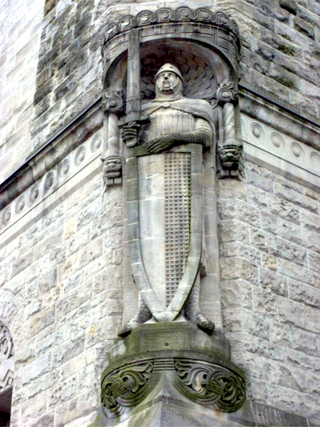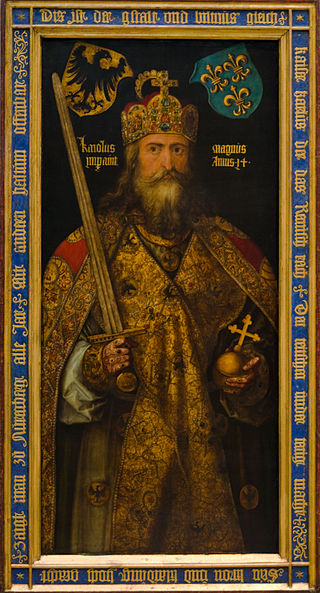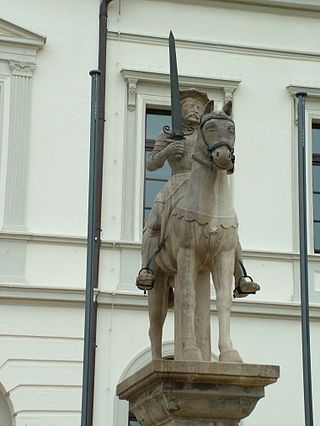Related Research Articles

Roland was a Frankish military leader under Charlemagne who became one of the principal figures in the literary cycle known as the Matter of France. The historical Roland was military governor of the Breton March, responsible for defending Francia's frontier against the Bretons. His only historical attestation is in Einhard's Vita Karoli Magni, which notes he was part of the Frankish rearguard killed in retribution by the Basques in Iberia at the Battle of Roncevaux Pass.

The Song of Roland is an 11th-century chanson de geste based on the deeds of the Frankish military leader Roland at the Battle of Roncevaux Pass in AD 778, during the reign of the Emperor Charlemagne. It is the oldest surviving major work of French literature. It exists in various manuscript versions, which testify to its enormous and enduring popularity in Medieval and Renaissance literature from the 12th to 16th centuries.

The chanson de geste is a medieval narrative, a type of epic poem that appears at the dawn of French literature. The earliest known poems of this genre date from the late 11th and early 12th centuries, shortly before the emergence of the lyric poetry of the troubadours and trouvères, and the earliest verse romances. They reached their highest point of acceptance in the period 1150–1250.

Ogier the Dane is a legendary paladin of Charlemagne who appears in many Old French chansons de geste. In particular, he features as the protagonist in La Chevalerie Ogier, which belongs to the Geste de Doon de Mayence. The first part of this epic, the enfance[s] of Ogier, is marked by his duel against a Saracen from whom he obtains the sword Cortain, followed by victory over another Saracen opponent from whom he wins the horse Broiefort. In subsequent parts, Ogier turns into a rebel with cause, seeking refuge with the King of Lombardy and warring with Charlemagne for many years, until he is eventually reconciled when a dire need for him emerges after another Saracen incursion.
The Matter of France, also known as the Carolingian cycle, is a body of medieval literature and legendary material associated with the history of France, in particular involving Charlemagne and the Paladins. The cycle springs from the Old French chansons de geste, and was later adapted into a variety of art forms, including Renaissance epics and operas. Together with the Matter of Britain, which concerned King Arthur, and the Matter of Rome, comprising material derived from and inspired by classical mythology, it was one of the great European literary cycles that figured repeatedly in medieval literature.
In the Middle Ages, Termagant or Tervagant was the name of a god that some European Christians believed Muslims worshipped. It originates in the eleventh-century Song of Roland

Durendal, also spelled Durandal, is the sword of Roland, a legendary paladin and partially historical officer of Charlemagne in French epic literature. The sword is famous for its hardness and sharpness. Sources including La Chanson de Roland state that it first belonged to the young Charlemagne.

In the 11th century Matter of France, Ganelon is the knight who betrayed Charlemagne's army to the Saracens, leading to the 778 Battle of Roncevaux Pass. His name is said to derive from the Italian word inganno, meaning fraud or deception. He is based upon the historical Wenilo, the archbishop of Sens who betrayed King Charles the Bald in 858.

Joyeuse was, in medieval legend, the sword wielded by Charlemagne as his personal weapon. A sword identified as Joyeuse was used in French royal coronation ceremonies since the 13th century, and is now kept at the Louvre.
Naimon, Duke of Bavaria, also called Naimes, Naime, Naymon, Namo, and Namus, is a character of the Matter of France stories concerning Charlemagne and his paladins, and appears in Old French chansons de geste and Italian romance epics. He is traditionally Charlemagne's wisest and most trusted advisor.

Oliver, sometimes referred to as Olivier de Vienne or de Gennes, is a legendary knight in the Matter of France chansons de geste, especially the French epic The Song of Roland. In the tradition, he was Roland's closest friend, advisor, confidant and brother-in-law to be, one of Charlemagne's twelve peers and brother of Aude, Roland's betrothed. He dies with Roland at the Battle of Roncevaux Pass. Some critics have linked his name to the olive tree, a biblical symbol of divine wisdom.

The Historia Caroli Magni, also known as the Historia Karoli Magni et Rotholandi or the (Pseudo-)Turpin Chronicle, is a 12th-century Latin chronicle consisting of legendary material about Charlemagne's campaigns in Spain. The chronicle states it was written by Charlemagne's contemporary Turpin, Archbishop of Reims, but it was found out as a medieval forgery. The work was extremely popular, and served as a major source of material on Charlemagne in chronicles, fiction and iconography throughout Medieval Europe. The miracles of the flowering lances and the death of Ferracutus appear on the windows of Chartres cathedral.

The Paladins, also called the Twelve Peers, are twelve legendary knights, the foremost members of Charlemagne's court in the 8th century. They first appear in the medieval chanson de geste cycle of the Matter of France, where they play a similar role to the Knights of the Round Table in Arthurian romance. In these romantic portrayals, the chivalric paladins represent Christianity against a Saracen (Muslim) invasion of Europe. The names of the paladins vary between sources, but there are always twelve of them led by Roland. The paladins' most influential appearance is in The Song of Roland, written between 1050 and 1115, which narrates the heroic death of Roland at the Battle of Roncevaux Pass.
Chanson d'Aspremont is a 12th-century Old French chanson de geste. The poem comprises 11, 376 verses, grouped into rhymed laisses. The verses are decasyllables mixed with alexandrines.

Veillantif (French), Vielantiu ; Vegliantin, Vegliantino or Brigliadoro (Italian) is the name of Roland the paladin's trustworthy and swift steed in the stories derived from the chansons de geste. The French name comes from an expression meaning "vigilant". Veillantif is first mentioned in The Song of Roland.
Girart de Vienne is a late twelfth-century (c.1180) Old French chanson de geste by Bertrand de Bar-sur-Aube. The work tells the story of the sons of Garin de Monglane and their battles with the Emperor Charlemagne, and it establishes the friendship of the epic heroes Olivier and Roland.
In The Song of Roland, Blancandrin is the instigator of the pagan plot against Roland and Charlemagne. He first appears in the final line of the second stanza of the poem as the only pagan who speaks to give King Marsile counsel, and is then described as the wisest of the pagans and a good and worthy knight, which are uncommon sentiments when describing the 'Saracens' throughout the poem. He suggests that Marsile accept the Christian faith and become a vassal of Charlemagne, as well as offering many gifts and the nobles' sons as hostages for execution if the Frank leaves Spain for Aix. He then acts as messenger to Charlemagne.
Marsile is a character in the French heroic poem The Song of Roland. He is the Muslim king of Arabs, conquering Saracens and of Saragossa. He first appears in Stanza 1, asking his barons for counsel because he is losing the war against Charlemagne. He readily accepts Blancandrin's proposal of surrender, and agrees to Ganelon's scheme after testing his worth and persuasion from his wife Bramimonde and his nobility (32–52). He takes part in the Battle of Roncevaux Pass, kills Bevon, Lord of Beaune and Dijon, Yvoire, Yvon and Gerald of Roussillon, before Roland cuts off Marsile's right hand and the head of his son, Jurfaleu the Blond, and Marsile is forced to flee (142) to Saragossa (187). Bound to his bed with his injuries, he summons help from Baligant (189), places Spain in Baligant's care (202), and later dies of his wounds, his army having been destroyed.
Aiquin, subtitled La conqueste de la Bretaigne par le roy Charlemaigne, is a medieval Old French chanson de geste about the rivalry between a Saracen king, Aiquin, and the Christian emperor Charlemagne. The French medievalist Joseph Bédier called it a "consolidation of history and legend in an imposing ensemble." It survives in one fifteenth-century manuscript, BnF fr. 2233, now in the Bibliothèque nationale de France. It is usually attributed to Garin Trousseboeuf, possibly a cleric of Dol. According to historian Éric Borgnis-Desbordes, it was written in the early thirteenth century, probably around 1213 and under the guise of a chanson de geste featuring Charlemagne and the Viking invasions in the tenth century, the author may have alluded to “the transition from Plantagenet domination to Capetian influence in Brittany”. It is the oldest extant French text from Brittany.
Cortain is a legendary short sword in the legend of Ogier the Dane. This name is the accusative case declension of Old French corte, meaning "short".
References
- 1 2 3 4 The Song of Roland. Translated by Sayers, Dorothy L. Hammondsworth, Middlesex, England: Penguin Books. 1957. p. 38. ISBN 0-14-044075-5.
- ↑ Song of Roland, vv. 345, 607. Brault, Gerard J., ed. (1978). The Song of Roland: Oxford text and English translation. Penn State Press. pp. 22–23, 38–39). ISBN 9780271038087.
- ↑ Song of Roland, v. 466
- ↑ Brault ed. tr. (1978), pp. 30, 31.
- ↑ Beckmann, Gustav A. (2023). Onomastics of the "Chanson de Roland": Or: Why Gaston Paris and Joseph Bédier Were Both Right. translated by Linda Archibald. Walter de Gruyter GmbH & Co KG. p. 541 and n1036. ISBN 9783110764468.
- ↑ Brault ed. tr. (1978), pp. 38, 39.
- ↑ Song of Roland, v. 607 [6]
- 1 2 Sholod, Barton (1963). Charlemagne in Spain: The Cultural Legacy of Roncesvalles. Librairie Droz. p. 188 and n288. ISBN 9782600034784.
- ↑ Cf. Scholod: "every one of the major Christian heroes, including Ganelon, possesses his 'hallowed' blade". [8]
- ↑ Lexer, Matthias (1876). "sahs". Mittelhochdeutsches handwörterbuch (in German). Vol. 2. Leipzig: S. Hirzel. p. 573.
langes messer, kurzes schwert
Woerterbuchnetz online - ↑ Rolandslied vv. 1568–1609. Wesle, Carl, ed. (1986), Das Rolandslied des Pfaffen Konrad, 3tte Auflage besorgt von Peter Wapnewski (3 ed.), Tübingen: Max Niemeyer Verlag, pp. 80–83.
- ↑ Rolandslied vv. 1585–8; Priest Konrad's Song of Roland, translated by Thomas, J. W., Columbia, S.C.: Camden House, 1994, pp. 12–13
- ↑ mor (French: maure +glais (Provençal, meaning "glaive, gladius"), Lejeune (1950), (p. 163), quoted by Scholod. [8]
- ↑ Lejeune, Rita (1950), "Les noms d'épées dans la Chanson de Roland", Mélanges de linguistique et de littérature Romances, offerts à Mario Roques , p. 163, cited (and given in English) by Bellamy (1987a), pp. 272–273, note 34
- ↑ Bellamy, James A. (1987a), "Arabic names in the Chanson de Roland: Saracen Gods, Frankish swords, Roland horse, and the Olifant", Journal of the American Oriental Society, 197 (2): 273, doi:10.2307/602835, JSTOR 602835
- ↑ Also Editorial Note , pp. 254–255, (JSTOR 45298606) to Bellamy, James A. (Winter 1987b), "A Note on Roland 609-10", Olifant, 12 (3/4): 247–254, doi:10.2307/602835, JSTOR 45298605
- ↑ Langlois, Ernest, ed. (1904), Table des noms, Paris: Emile Bouillon
- ↑ Bailey, Nathan (1731), An Universal Etymological English Dictionary
